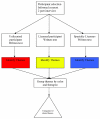The influence of practice standards on massage therapists' work experience: a phenomenological pilot study
- PMID: 21589709
- PMCID: PMC3091437
- DOI: 10.3822/ijtmb.v3i3.73
The influence of practice standards on massage therapists' work experience: a phenomenological pilot study
Abstract
This original research is framed in phenomenological methodology, based on interviews conducted and interpreted using qualitative research methods. The findings suggest that, because of both direct and indirect factors (such as the nebulous nature of the work, general isolation in work conditions, and physical concerns), massage therapists perform their work with multiple sources of ambiguity that are potentially anxiety-causing. Licensing offers potential relief for this anxiety, but also generates a new set of frustrations and work concerns. The new concerns include the potential that practice will change to adapt to non-relevant standards and the difficulty of defining a body of work that frequently defies a "one size fits all" categorization. This pilot study suggests several areas for further exploration and also demonstrates the generativity of phenomenological methodology for research related to massage therapy.
Keywords: Bodyworker; anxiety; health care; hermeneutic; jurisdiction; licensing; professions; qualitative.
Figures
References
-
- Kahn J. Massage Therapy Research Agenda. Evanston, IL: Massage Therapy Foundation; 2002.
-
- American Massage Therapy Association (AMTA). AMTA Timeline – Full Version: Advancing the Massage Therapy Profession for 60+ Years. AMTA website. http://www.amtamassage.org/About-AMTA/AMTA-History.html. Published n.d. Updated n.d. Accessed January 8, 2010.
-
- Bentz VM, Rehorick DA. Transformative phenomenology: a scholarly scaffold for practitioners. In: Rehorick DA, Bentz VM, eds. Transformative Phenomenology: Changing Ourselves, Lifeworlds, and Professional Practice. Lanham, MD: Lexington Books; 2008: 3–31.
-
- Rich GJ, ed. Massage Therapy: The Evidence for Practice. Edinburgh, UK: Mosby; 2002.
-
- Walkley S. When the body leads the mind: perspectives on massage therapy in the United States. In: Oths KS, Hinojosa SZ, eds. Healing by Hand: Manual Medicine and Bonesetting in Global Perspective. Walnut Creek, CA: AltaMira Press: 2004: 23–42.
LinkOut - more resources
Full Text Sources


